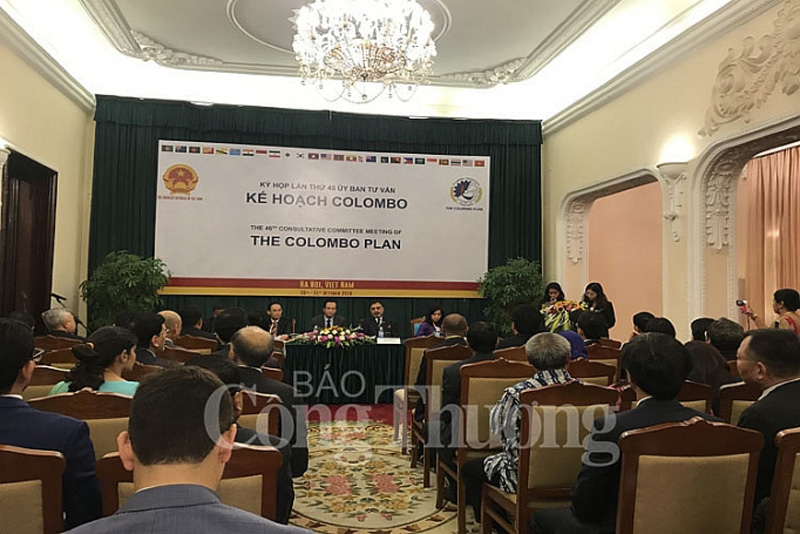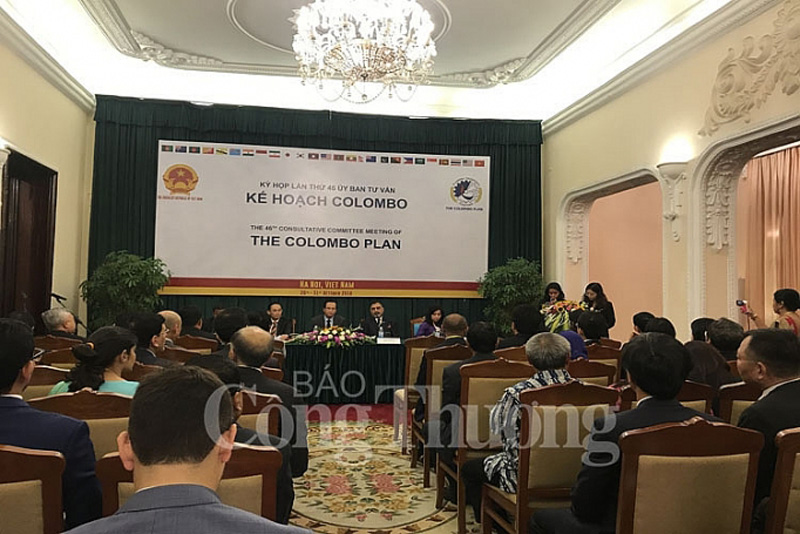
The 46th Consultative Committee Meeting of the Colombo Plan (CCM46) kicked off in Hanoi on October 30. This is the first time Vietnam has hosted the Colombo Plan’s important session, which this year is being held to focus on gender equality.
At the meeting (Source:
congthuong.vn)
The two-day events brings together nearly
100 delegates from 23 member nations, representatives from the Colombo Plan
Secretariat and many of Vietnam’s ministries and agencies, as well as
observers.
In his opening speech, Minister of Labour, Invalids, and Social Affairs Dao
Ngoc Dung highlighted the importance of the meeting, which occurs every two
years, saying that the Colombo Plan’s top priority meet up aims to address
shortcomings and set out orientations for cooperation among member countries
over the next two years.
Minister Dung appreciated the valuable cooperation that the Colombo Plan has
given Vietnam,
especially in helping the country train more than 500 staff in various fields
such as drug prevention, public administration, environmental protection,
private economic development, and gender equality.
He stressed that Vietnam
has selected the topic of gender equality for this meeting because it is an
area of special concern that has been integrated into all socio-economic
development programmes of the country.
Vietnam
has achieved remarkable results in terms of gender equality measures, and is
one of the countries with the best gender equality index, ranking second in the
ASEAN region, he said.
The minister noted, however, that Vietnam still faces many challenges
such as new requirements from the Fourth Industrial Revolution, domestic
violence, violence against young girls, and women trafficking. He said it is
important to strengthen close cooperation among member countries in sharing
experiences, implementing gender equality programmes and courses, as well as
continuing programmes in drug prevention and detoxification, especially
synthetic drugs.
He emphasised Vietnam’s
increasingly active participation in managing Colombo Plan activities, such as
its successful candidacy for the position of Director of the Drug Advisory
Programme in 2009-2011, and the General Secretary of the Colombo Plan for the
2018-2022 term.
Addressing the event as Chairman of the CCM46, Deputy Foreign Minister Le Hoai
Trung highlighted some of the positive effects from the training courses
provided by the Colombo Plan to Vietnam
during its national development.
He said the meeting offers a good opportunity for member countries to
re-evaluate objectives and proposals that have been implemented in the last two
years, and map out appropriate directions for the Colombo Plan in the time to
come, towards improving its role and influence.
General Secretary of the Colombo Plan Phan Kieu Thu presented the target
programme during her term, especially those goals for the next two years.
Participants also heard the annual report on the operation of the Colombo
Plan’s Secretariat, as well as those on training and capacity building
programmes.
They also discussed and agreed on orientations and activities of the Colombo
Plan for the next two years, as well as commitments of each member country.
The Colombo Plan for Cooperative Economic and Social Development in Asia and
the Pacific was conceived at the Commonwealth Conference on Foreign Affairs
held in Colombo, Ceylon (now Sri Lanka) in January 1950 and was launched on
July 1, 1951, as a cooperative venture for the economic and social advancement
of the peoples of South and Southeast Asia.
It is based on the partnership concept for self-help and mutual help in the
development process, with the focal areas being human resources development and
south-south cooperation.
With 27 official members, the Colombo Plan is a forum for discussing
development needs, sharing experience, implementing programmes for stronger
socio-economic development, and supporting less developed countries in the
region.
The Colombo Plan mainly operates through organising training courses and
helping its member nations develop human resources. It now runs four training
programmes including the Drug Advisory Programme (DAP), the Programme for
Public Administration and Environment (PPA&ENV), the Programme for Private
Sector Development (PPSD), and the Long-Term Scholarships Programme
(LTSP).
Since it officially began its membership with the organisation in 2003, Vietnam has
sent nearly 400 officials to attend training courses within the Colombo Plan’s
cooperation programmes in the fields of drug prevention, public administration,
reproductive health, and environmental protection.
Source: VNA
The emulation movement "Hoa Binh joining hands to build new-style rural areas” has been widely spreading, becoming a driving force that motivates the localities to renew rural landscapes and improve the material and spiritual lives of the residents. In this movement, the people play a central role-both as the main implementers and direct beneficiaries of its outcomes.
In response to the global digital revolution, Hoa Binh Newspaper is transforming itself into a modern and multi-platform media hub, blending cutting-edge technology with a restructured newsroom and a new generation of tech-savvy journalists.
Hoa Binh province’s Association of the Elderly recently held a conference to review the project on expanding the inter-generation self-help club model until 2025.
In a move to implement Resolution No. 57-NQ/TW, issued on December 22, 2024 by the Politburo, which targets breakthroughs in science-technology development, innovation, and digital transformation, the Hoa Binh provincial Department of Health has issued a plan to roll out the "Digital Literacy for All” campaign within the local health sector.
An Nghia Commune (Lạc Sơn District) is one of the communes that achieved the tha standard of the national new rural area in 2018. Entering a new development phase, the commune is now trying to meet the criteria for the advanced new rural development. With the strong political will and the public consensus, the commune is gradually overcoming the challenges to reach this goal, aiming for the sustainable development.



